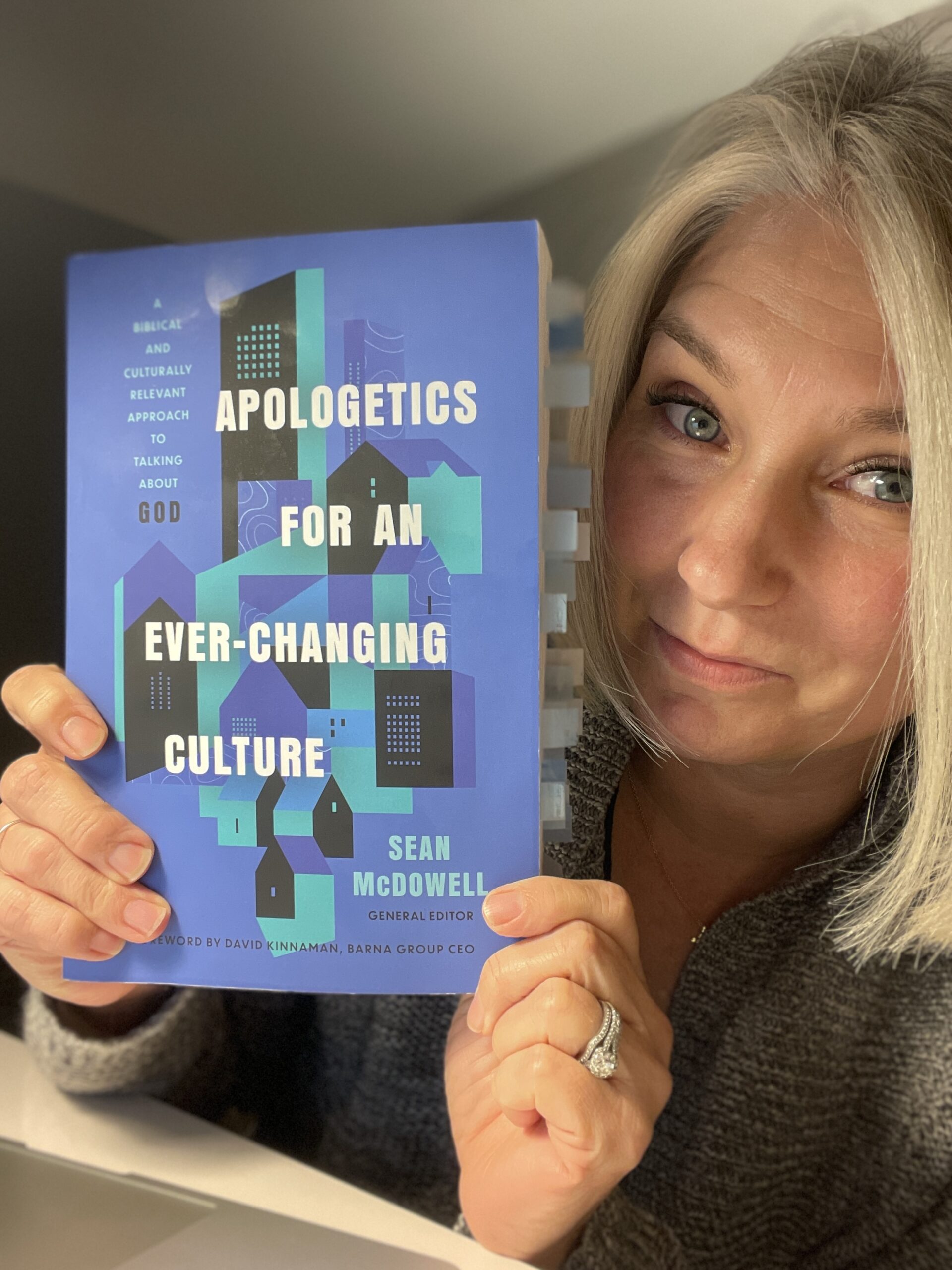TEACHING WOMEN TO GRACEFULLY DEFEND THE CHRISTIAN FAITH AND BIBLICAL WORLDVIEW.

Why Are We Always Hopping a Plane to “Egypt?”
Mark Twain famously said, “Denial ain’t just a river in Egypt.”
Sometimes we find it easier to live in denial of the truth than to accept it, so we hop planes to “Egypt.”
The truth isn’t always pretty. It’s not always what we want to hear. The situation gets even more uncomfortable when the truth we don’t want to acknowledge is the result of mistakes we’ve made and sins we’ve committed.
Instead of dealing with our circumstances we live in denial that they are in fact real.
Sometimes our circumstances are a result of our decisions and actions. Sometimes they’re entirely out of our control or influence. Either way, we can find ourselves embracing denial over truth.
Here are a few examples:
We spend money we don’t have on things we don’t need, using credit cards we’re not sure how we’ll pay off. We are in denial that we can’t afford something, but we decide we must have it and we cannot wait. So we pull out those magical little plastic rectangles and feed our need.
We decide we no longer like our spouse and they aren’t meeting our idea of marriage. We tell ourselves that if they’ll just change and be who we want them to be, everything will be better. We refuse to look in the proverbial mirror where we might be confronted with places our own heart, mind and actions need to change.
We miss a friendship with someone we had a disagreement with but instead of reaching out and saying “I’m sorry,” we pretend the relationship wasn’t that important to us and “move on.” We’re unwilling to admit that we were partially to blame for the falling out.
We Ignore Warning Signs and Put on Blinders
We refuse to listen when we’re confronted with a truth we don’t like. We ignore warning signs and put on blinders so we won’t have to deal with anything that doesn’t make us feel empowered, encouraged and celebrated.
We don’t like where we’re at. We don’t like the circumstances we’re in. We start thinking that the grass is surely greener on the other side. And don’t we deserve nicer, better, greener grass?
In essence, we hop a plane to “Egypt.”
And then, after we’ve seen the Nile and tried the greener grass, we start to get the sense that maybe things aren’t as great over here as we thought. Or maybe, we start to get that funny deja vu feeling, “this is weirdly familiar.”
Because here’s the thing about hopping a plane to “Egypt” – we often find ourselves right back where we were before. Maybe our location has changed, but our hearts haven’t. We keep picking up the same bad habits, committing the same mistakes, walking in the same sin as we did before.
That’s not good news.
We’ve come a long way, how could we be here again?
It’s not the “transformation” we were looking for.
And yet, here we are. We’re back in Egypt and we haven’t learned a thing.
We deny the truth, because it hurts.
It hurts, because it isn’t what, where, who or how we want it to be.
It reminds me of the Israelites and the prophet Jeremiah.
In the book of Jeremiah, almost to the end of the book (Chapter 42), after Jeremiah has had his life threatened, been thrown in prison and then released and allowed to stay in Jerusalem (instead of going in captivity to Babylon), the remnant of Judah (the southern kingdom of Israel) comes to the now old prophet and ask him to pray to The Lord on their behalf.
It’s a long story (and a really good one), but essentially Jeremiah has been prophesying for years and the people and the kings haven’t liked it one bit. They weren’t big fans of the words that were coming out of his mouth.
God used Jeremiah to share truth with His people, but it wasn’t what they wanted to hear. Jeremiah’s prophecies included God’s warnings that Judah (where Jerusalem was located) would be overtaken by Babylon, taken into captivity and led away from their homeland because they had been habitually disobedient to God.
Nobody wants to hear that.
We all prefer to hear good news… not bad news.
Like when the plumber comes to work on your hot water heater and says, “I’ve got good news and bad news.” I don’t really want to hear the bad news. Or at least give me the good news first. Then maybe the bad news will be a little more palatable?
Sure the plumber could give me only the good news that my water heater doesn’t need to be totally replaced, just one of the elements is fried and needs to be replaced. And it might make me happy – for a while. But I also need to know the bad news – we have extremely hard water and are going to have to keep replacing elements and hot water heaters until we invest in a water filtration system strong enough to keep the minerals from reaching the tank.
That filtration system is expensive. It’s not good news to hear that’s what we need. But it’s the truth. We can keep spending several hundred dollars every six months to keep our current hot water heater going or we can bite the bullet and invest several thousands of dollars in the filtration system and guard our water heater and other appliances from being damaged in the long run.
That’s why I like our plumber. He’s an honest guy. He tells us the truth, even when it would be easier to just tell us the good news and leave it at that.
Jeremiah was like an honest plumber. He was a true prophet of God. He knew and had experienced over and over again that revealing the truth the Lord had spoken to him wasn’t likely to be well received.
He did it anyway.
He kept sharing what the Lord had told him to say to Judah, and they kept rejecting it.
He told them that they would suffer famine. They wouldn’t listen.
He told them that Babylon was going to come and overtake Jerusalem. They wouldn’t listen.
He told them that they would be taken into captivity and led away. They wouldn’t listen.
Starting to see a pattern?
Not till after these things had happened and only a small remnant of some soldiers and mostly poor people were left in Judah, did they seem like they were ready to listen.
Finally, they come to Jeremiah and ask him to intercede with God on their behalf.
“Let our plea for mercy come before you, and pray to the Lord your God for us, for all this remnant – because we are left with but a few, as your eyes see us – that the Lord your God may show us the way we should go, and the thing that we should do.” (Jeremiah 42:2-3 | emphasis on your added by me)
These people were frazzled. Shook. Worn out. They had suffered and survived an invasion of their land, seen their loved ones and friends hauled off, seen their leaders murdered. They were desperate. Desperate for peace. Desperate for safety. Or at least they appeared that way.
But take a closer look at the word I italicized in the verses above: your.
When the frazzled, shook, worn out remnant appealed to Jeremiah they didn’t say our God, they said your God. They still were not willing to submit to God, even after ALL they had seen and experienced. Even after Jeremiah’s prophecies about what would happen to Israel if they carried on being disobedient to the Lord, even after those prophecies came true, the people would not submit to God as their God.
And, if you back up into the previous chapter and read the second to last verse (41:17), you’ll see that the leaders of the forces had taken the remaining people and gone to Geruth Chimham, a place near Bethlehem and that they were “intending to go to Egypt.”
So, when this remnant asks Jeremiah to “plea for mercy” and “pray to God” on their behalf they aren’t doing it with their whole hearts. They aren’t doing it with submitted hearts. They already have a plan and what they’re looking for is God’s stamp of approval.
Jeremiah in response to them says this: “I have heard you. Behold, I will pray to the Lord your God according to your request, and whatever the Lord answers you I will tell you. I will keep nothing back from you.” (Jeremiah 42:4, emphasis added by me)
Jeremiah says your God to remind them who they are asking for mercy.
And here’s the kicker, the people respond with this:
“May the Lord be a true and faithful witness against us if we do not act according to all the word with which the Lord your God sends you to us. Whether it is good or bad, we will obey the voice of the Lord our God to whom we are sending you, that it may be well with us when we obey the voice of the Lord our God.” (Jeremiah 42:5-6)
Again, the people say your God when talking to Jeremiah. They do wrap it up with our God a couple of times, but we still get the sense that they aren’t being honest. Especially when they say, “whether it is good or bad, we will obey the voice of the Lord” – after so many instances of utter disobedience, do we really think they’re going to change?
Spoiler alert: they don’t.
Ten days after the people ask Jeremiah to pray to the Lord for them, the word of the Lord comes to Jeremiah. God didn’t respond immediately, He made them wait. Sound familiar?
Jeremiah shares with them the good news and the bad news. The gist of it is this. If they stay in Judah they don’t need to be afraid. God has got their back and He is with them. He will protect them from the king of Babylon (who they were afraid of) and He will build them up. This is good news right? They can stay in their land… their own land. They don’t have to flee.
But the bad news is, if they flee, if they hightail it to Egypt, they’re done for.
God warns them that “If you set your faces to enter Egypt and go to live there, then the sword that you fear shall overtake you there in the land of Egypt, and the famine of which you are afraid shall follow close after you to Egypt, and there you shall die.” (Jeremiah 42:15-16)
God gave them the good news first. Then He gave them the bad news.
And they didn’t listen.
At the end of chapter 42, Jeremiah finishes talking. He’s delivered the message from the Lord, loud and clear. DO NOT GO TO EGYPT. Right before he finishes speaking he shares words that are his own. He reminds the people that they were the ones who sent him.
“For you sent me to the Lord your God saying, ‘Pray for us to the Lord our God, and whatever the Lord our God says, declare to us and we will do it.’ And I have this day declared it to you, but you have not obeyed the voice of the Lord your God in anything that he sent me to tell you. Now therefore know for a certainty that you shall die by the sword, by famine, and by pestilence in the place where you desire to go to live.” (Jeremiah 42:20-22, emphasis added by me).
He reminds them that they said they would do whatever God declared but that they hadn’t been faithful to obey His voice before. And again he says your God. He can’t make this any more clear and the gig is up, he (Jeremiah) knows they intend to go to Egypt.
And how do they respond? “You are telling a lie. The Lord our God did not send you to say, ‘Do not go to Egypt to live there.’” (Jeremiah 43:2, emphasis added by me).
They call Jeremiah a liar and now they say our God with 100% confidence.
Oh no they didn’t!
Yep. They sure did.
Guess what else they did? They hightailed it for Egypt. Right back to the land and the people God had delivered their ancestors out of in the 13th Century BCE under the leadership of Moses.
900 years had passed and God had shown himself over and over again to be their God. He had shown himself to be their protection. To be their provision. Time and time again. And would they listen?
Nope.
They went back to Egypt.
They went back to the place God told them explicitly not to go.
They went back to the place God told them they would be overtaken. That their worst fears would come true.
They did it anyway.
They didn’t “hop a plane to Egypt,” but they went right back to what God told them would destroy them. They didn’t listen. They didn’t submit. They didn’t repent.
They chose denial and like Mr. Twain said, “it ain’t just a river in Egypt.”
I don’t know about you, but I want to stand firm in faith and trust God. I don’t want to keep hopping a plane because I forget God’s faithful goodness to me.
The best way to not forget…
be in the Word, every day.
Leave a Reply
RECENT
Blog Posts

Have you ever wondered if the Bible is reliable? Can you trust that what’s written in Scripture is correct? You can! And not just because you believe the Bible is reliable, but because the Bible has proven itself to reliable again and again. In this episode of the unBibled podcast, host Liz Cobo shares the […]
READ THIS POST
filed in:

It can be overwhelming to start reading the Bible if you’ve never done it before. It’s a big book! But don’t let the size of it intimidate you. While a lot of people recommend starting with the gospels in the New Testament, particularly the Gospel of John, I prefer to start at the very beginning […]
READ THIS POST
filed in:

Have you ever wondered what Christian Apologetics is actually about? In this episode of the unBibled podcast, host Liz Cobo explains what the word apologetics means and why ALL Christians are called to always be ready to “give a defense” for the hope they have in Jesus. I’d love to hear from you if you […]
READ THIS POST
filed in:

If you’re going to choose only one book on apologetics this year – read this one! Apologetics for an Ever-Changing Culture is a must read for any Christian who wants to be ready to share and defend their faith and worldview in our rapidly evolving culture… and to do it as the Apostle Peter encouraged, […]
READ THIS POST
filed in:
"Beware of false prophets, who come to you in sheep's clothing but inwardly are ravenous wolves. You will recognize them by their fruits. Are grapes gathered from thornbushes, or figs from thistles? So, every healthy tree bears good fruit, but the diseased tree bears bad fruit. A healthy tree cannot bear bad fruit, nor can a diseased tree bear good fruit. Every tree that does not bear good fruit is cut down and thrown into the fire. Thus you will recognize them by their fruits."
Matthew 7:15-20 ESV
Develop your apologetics and Bible study skills
Join the Email List
OPT OUT AT ANY TIME